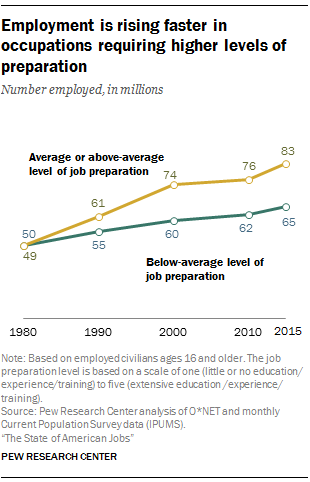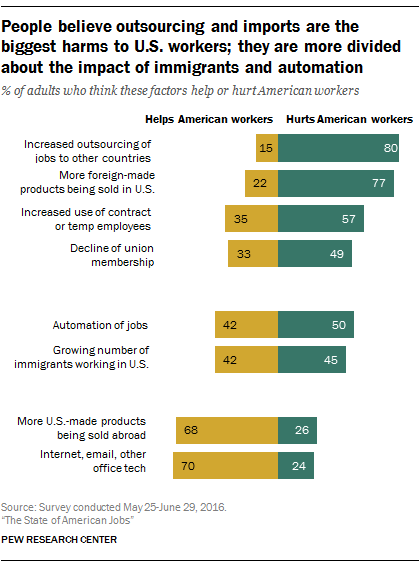October 7, 2016
The American workplace is more skilled, but workers are concerned they are becoming irrelevant 0
 The ‘Tectonic changes’ that are reshaping the US workplace and the response to them are the subject of a major new research project from the Pew Center in association with the Markle Foundation. The study of over 5,000 US workers carried out over the Summer found that the nature of jobs is undergoing a fundamental shift with greater emphasis on knowledge as well as analytical, interpersonal and communication skills. In response, workers are retraining and reassessing their abilities to adapt to the demands of employers. Despite this, a growing number are worried that they are becoming irrelevant and have diminishing faith in the ability of politicians, the education system and their employers to address their concerns.
The ‘Tectonic changes’ that are reshaping the US workplace and the response to them are the subject of a major new research project from the Pew Center in association with the Markle Foundation. The study of over 5,000 US workers carried out over the Summer found that the nature of jobs is undergoing a fundamental shift with greater emphasis on knowledge as well as analytical, interpersonal and communication skills. In response, workers are retraining and reassessing their abilities to adapt to the demands of employers. Despite this, a growing number are worried that they are becoming irrelevant and have diminishing faith in the ability of politicians, the education system and their employers to address their concerns.
 This is reflected most obviously in the fact that people are increasingly concerned about job security, even when they like their current role and believe they are a good fit. The study found that a majority of Americans are happy with their jobs with nearly half (49 percent) saying they are very satisfied and another 30 percent saying they are somewhat satisfied with their current role. Only about 15 percent said they were either very dissatisfied or somewhat dissatisfied with their positions.
This is reflected most obviously in the fact that people are increasingly concerned about job security, even when they like their current role and believe they are a good fit. The study found that a majority of Americans are happy with their jobs with nearly half (49 percent) saying they are very satisfied and another 30 percent saying they are somewhat satisfied with their current role. Only about 15 percent said they were either very dissatisfied or somewhat dissatisfied with their positions.
They are also more likely to stay in their jobs, with the share of people who’ve been with their current employer for at least five years up to 51 percent in 2014, from 46 percent in 1996, according to Census figures quoted in the study. Nevertheless, nearly two-thirds (63 percent) say that workers overall have less security now than they did 20 to 30 years ago, with only 16 percent saying they have more.
Despite the rhetoric of political candidates, the biggest concern Americans have about their job security isn’t the effect of immigration, but their irrelevance in the workplace. Over three-quarters
(80 percent) of survey respondents said outsourcing hurts American workers. When it comes to the impact of immigration, there is a clear split between those who believe migrant workers harm or help the economy, with a positive shift in attitudes over the past decade. 42 percent of respondents believe immigration helps the economy while 45 percent claims it is harmful. This marks a significant shift from a study carried out ten years earlier, in which only 28 percent of respondents said immigrants contribute positively to the American workplace.
Other key findings of the study presented by the Pew Center include:
Employment has been rising faster in occupations requiring more preparation. As of 2015, some 83 million people worked in jobs that require an average or above average level of preparation (including education, experience and job training), up from 49 million in 1980 – a 68 percent increase. This was more than double the 31 percent rise in employment in positions requiring a below average level of job preparation. Employment in these jobs increased from 50 million to 65 million over the same time period.
 Employment and wages have increased most in occupations that require higher social or analytical skills. While employment grew by 50 percent over all occupations from 1980 to 2015, this growth was much higher among jobs that require average or above average social skills (83 percent), such as interpersonal, management and communication skills, and those that require higher levels of analytical skills (77 percent), such as critical thinking and computer skills. Meanwhile, employment is up by only 18 percent in occupations depending more on physical skills such as manual labor, machinery operation or tool manipulation. Wages have also increased more among jobs requiring higher social or analytical skills. From 1990 to 2015, the average hourly wage for occupations requiring higher levels of analytical skills rose from $23 to $27. Similarly, the mean wage for occupations requiring higher levels of social skills rose from $22 to $26 per hour. By contrast, the mean hourly wage for jobs requiring average or above average physical skills only rose from $16 to $18.
Employment and wages have increased most in occupations that require higher social or analytical skills. While employment grew by 50 percent over all occupations from 1980 to 2015, this growth was much higher among jobs that require average or above average social skills (83 percent), such as interpersonal, management and communication skills, and those that require higher levels of analytical skills (77 percent), such as critical thinking and computer skills. Meanwhile, employment is up by only 18 percent in occupations depending more on physical skills such as manual labor, machinery operation or tool manipulation. Wages have also increased more among jobs requiring higher social or analytical skills. From 1990 to 2015, the average hourly wage for occupations requiring higher levels of analytical skills rose from $23 to $27. Similarly, the mean wage for occupations requiring higher levels of social skills rose from $22 to $26 per hour. By contrast, the mean hourly wage for jobs requiring average or above average physical skills only rose from $16 to $18.
The majority of American workers say they will need continuous training to keep up with changes in the workplace, and many say they do not have the skills they need to get ahead. Some 54 percent of adults in the labour force say that it will be essential for them to get training and develop new skills throughout their work life in order to keep up with changes in the workplace. An additional one-third say this would be important but not essential. Those with the highest levels of education are the most likely to say this will be essential. About a third of workers (35 percent) say they do not currently have the education and training they need to get ahead. Yet many are trying to do something about it: 45 percent of employed adults report they have pursued extra training to maintain or improve their job skills in the past year.
The public has mixed views on the value of higher education in preparing people for the workplace. Many of those with associate or bachelor’s degrees say their own college experience was very useful for helping them grow personally and intellectually (62 percent), opening up job opportunities (53 percent) and providing them with useful job-related skills and knowledge (49 percent). But more generally, Americans are somewhat skeptical about the value of a college degree in the job market: Only 16 percent of all U.S. adults – including 13 percent of those with at least a four-year college degree – say that a bachelor’s degree prepares students “very well” for a well-paying job in today’s economy, while an additional 51 percent say it prepares students somewhat well. And 12 percent say a two-year associate degree prepares students very well (with 46 percent saying it prepares them somewhat well). About a quarter of Americans (26 percent) say that certification programs in a professional, technical or vocational field prepares students very well (52 percent say somewhat well).
Most Americans think the responsibility for making sure the workforce has the right skills and education to be successful in today’s economy lies with individuals themselves. About three-quarters of U.S. adults (72 percent) say that individuals should bear “a lot” of responsibility for making sure they have the right skills and education to be successful in today’s economy. A somewhat smaller share (60 percent) says that public K-12 schools should have a lot of responsibility, and still smaller shares say a lot of responsibility should fall on colleges and universities (52 percent), employers (49 percent), state governments (40 percent) or the federal government (35 percent). Republicans and independents who lean toward the Republican Party are particularly likely to place the emphasis on individuals, while Democrats and Democratic leaners are more likely to place the responsibility on public schools, colleges and the government.
Americans say job security is on the decline, but most workers feel secure in their own jobs. About six-in-ten adults (63 percent) say the average working person in the U.S. has less job security now than they did 20 or 30 years ago. An additional 19 percent say job security is about the same as it was then and 16 percent say there is more job security now. Yet most workers are confident that their own jobs are secure: 88 percent say they are not too or not at all likely to lose their jobs in the next 12 months. The public sees threats to workers from multiple fronts. For example, most Americans say that increased outsourcing of jobs to other countries (80 percent) and more foreign-made products being sold in the U.S. (77 percent) hurt American workers. Workers see automation as less of a threat. Large majorities see increased use of the internet and other technology in the workplace (70 percent) and more U.S.-made products being sold abroad (68 percent) as helping American workers.













